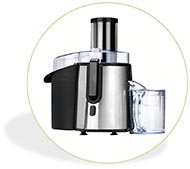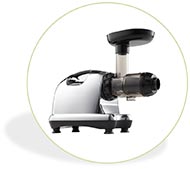How to Choose a Juicer
NOTE: Juicer is recommended (but not required). If you have any type of juicer, you can make your own fresh juices. If you do not have one, you can use your blender. This is useful for making blended shakes, broths, and tea. You can also visit a local juice bar. Any of these options are just great.
If you’re considering buying a juicer, there are lots of different brands and models, but really just 2 types of juicers. Both have their advantages, and both have their drawbacks.
The Centrifugal Juicer

These are some of the most readily available juicers in the world. You can find them at almost any kitchenware store, on television infomercials, and even in big discount department stores.
How it Works
- The centrifugal juicer has a spinning colander that you push produce into (vertically) and it simultaneously shreds and extracts the juice.
Advantages
- Price – they are very affordable and durable. For $60-100, you can purchase an excellent model with a long-time warranty.
- Easy to Clean – centrifugal juicers are perhaps the fastest and easiest to clean, the parts come off easily and wash in minutes.
Disadvantages
- Struggles with Leafy Vegetables – centrifugal juicers struggle with the leafy vegetables, herbs, and super nutritious greens we love. It works, but it doesn’t extract as much juice as it’s really designed for harder items like apples, beets, and cucumbers.
- Oxygenates the Juice – with juice, fresh is best, and because the centrifugal juicer spins so quickly, it “fluffs” the juice and exposes it to a lot of oxygen which means the juice doesn’t last as long and is not as fresh. This is not a huge problem, but something to consider.
Masticating Juicer

These are slow-moving extractors that “chew” produce and then press out the juice from the pulp very efficiently. They are difficult to find in local retail stores since it’s a specialty item, and in most cases, you’ll probably need to order online.
Advantages
- Extracts More Juice – this juicer extracts a maximum quantity of juice from your produce saving you money
- Slow Speed Means Less Oxygen – since the juicer moves slowly, it doesn’t oxygenate the juice the way a centrifugal juicer would
- Great for Greens – this juicer can handle leafy greens very well, including wheatgrass
- Multi-Purpose – aside from just juicing, it can be used for making nut butter, fresh fruit sorbets and many other delicious foods.
- Fast – centrifugal juicers are fast, many times faster than any other type of juicer in extracting the juice.
Disadvantages
- Price – it’s an expensive juicer, usually 3-4x the cost of a centrifugal juicer. Prices vary, but $300-400 is common.
- Slow to Clean – this juicer is not hard to clean, but it’s not fast either. It takes longer as there are smaller parts so you lose time in the cleanup.


Sherri, et al — Thanks!!
OK — this is embarrassing to admit, but I’m just now cottoning on to the fact that this cleanse involves removing the fiber from the vegetables. I’m SURE this salient point was addressed somewhere, but it takes a while to learn how to tool around to all the areas of information.
Last night in the juicing webinar, Jon mentioned something about how our bodies don’t have to do the work of digesting and can get right to healing (or something to that effect), and it began to dawn on me.
Can you direct me to a place where the significance of this is discussed more fully? I’m totally up to doing this, but I’m always hearing about the importance of fiber for detoxing, so it’s an interesting conundrum.
Thanks!
Hi Tandy,
Fiber is important and vegetable fiber is not the worst thing in the world when your cleansing, but you digestion still has to do some work to process the fiber. We prefer that you get your fiber from psyllium husks (preferably organic) as they are very easy on the digestion and pass right though you.
Jon
I have a Nutri Bullet, will it work? Ron
Hi Ron,
Yes, but in the second week, while you’re in the cleans phase, strain the juice through a calendar or cheese cloth, so you’re only getting the juice. This is just for that one week, so you can give your digestion a break.
I purchased a hand crank one for wheatgrass. Is that the same as the second type.
Hi Sharon,
Usually the hand crank wheat grass juicers are only meant for wheat grass and may not work for juicing a large about of vegetables. You can experiment and see how it goes.
Best Regards
The GM Team
We only have a blender — somewhere Jon said that he would explain how to use it to macerate vegetables, but I’ve been unable to locate that information. Can you help? Many thanks!
Hi Tandy, Juicing with a Blender has been added to the How To Videos section. Hope that helps! Best, Sherri, GM Team